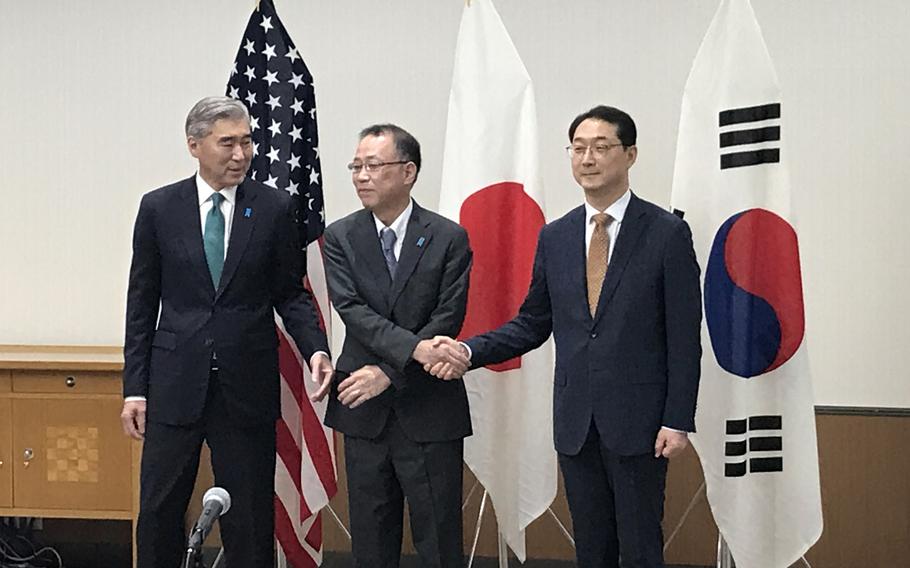
Sung Kim, left, the U.S. special representative for North Korea policy; Funakoshi Takehiro, center, director general of Japan's Asian and Oceanian Affairs Bureau at the Foreign Ministry; and Kim Gunn, South Korea's special representative for Korean Peninsula peace and security affairs, pose at Prince Hotel Karuizawa West in Nagano, Japan, Thursday, July 20, 2023. (Seth Robson/Stars and Stripes)
On Aug. 18, Prime Ministers Fumio Kishida of Japan and Yoon Suk Yeol of South Korea met with President Joe Biden at Camp David to complete a historic accord. The three nations will significantly expand trilateral military exercises. Seoul and Tokyo will also significantly expand communication and cooperation related to security.
This follows up on a March meeting in Tokyo between the leaders of the two Asia nations. At that time, they reached positive agreements on trade and security
Also in March, South Korea’s foreign minister, Park Jin, announced that a foundation funded by Korean companies would compensate victims of forced labor during Japan’s occupation of Korea. President Joe Biden immediately praised this generous South Korea initiative.
The two nations share a complex, difficult history. Japan’s long-term occupation of Korea in the 20th century, which continued until 1945, included forced prostitution of Korean women and more general exploitation of the population. Totalitarianism has now faded, but legacies and painful memories continue.
South Korea’s Supreme Court ruled in 2018 that a comprehensive settlement of wartime compensation claims, reached in 1965, does not prevent individuals from seeking reparations. This opened the door for individuals to sue Japanese companies for compensation.
In reaction, Japan announced that special trade relations with South Korea would end. Japanese companies would have to make formal application, which can be quite cumbersome, for any technology-related deals with South Korea. South Korea retaliated. This dispute has been ended.
The two economies are world leaders in scale, production and overall effectiveness but are notable for remaining surprisingly separate from another. This directly reflects their extremely difficult history.
South Korea’s earlier chief executive, President Moon Jae-in, helped encourage the current progress. In August 2019, he took the occasion of the 10th anniversary of the death of South Korea’s great leader Kim Dae-jung to underscore the importance of a 1998 Joint Declaration between Japan and South Korea, and the fundamental need for partnership.
Kim’s effectiveness in fighting South Korea’s earlier harsh dictatorship marked him as a special target, and he survived at least five attempts on his life. One of the most dramatic incidents occurred in 1973, when South Korean government agents kidnapped him from a Tokyo hotel and took him to a ship, where they intended to kill him at sea.
Donald Gregg, the highly experienced CIA station chief in South Korea, acted decisively. After a U.S. helicopter flew low over the ship, and Gregg intervened personally, and forcefully, kidnappers reluctantly released Kim.
Gregg, whose intelligence career dates back to training commandos during the Korean War, later served as U.S. ambassador to Seoul during the George H.W. Bush administration and more recently provided outstanding professional leadership to the Korea Society based in New York City.
Gregg was also national security adviser to Vice President Bush. Most of his career was spent with CIA. He personified the commitment and dedication of career professionals crucial to our success in the Cold War.
The Korean War effectively transformed the Cold War from a conflict centered on Germany and Europe to a complex global competition. That costly war from 1950 to 1953 also forged the extremely strong, ongoing partnership between South Korea and the United States.
Kim’s courage and commitment to representative government were rewarded when this great leader was elected president of South Korea in 1997. Without hesitation, he moved to begin détente with the North Korea regime. This culminated in a dramatic summit meeting in 2000 with the leader of North Korea, beginning the fitful interchange with Pyongyang.
Kim Dae-jung received the 2000 Nobel Peace Prize for his leadership, which resonates well beyond Korea.
Preoccupation with China should not distract from remarkable, positive developments in Asia.
Arthur I. Cyr is author of “After the Cold War.”